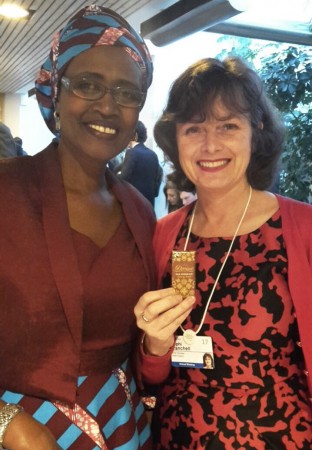Divine Chocolate chief executive Sophi Tranchell was one of the 2,500 business leaders and heads of state attending the World Economic Forum in Davos.
A Fairtrade chocolate company, Divine is 44% owned by cocoa farmers from Kuapa Kokoo, a cocoa co-operative in Ghana whose farmer members get 44% of the company’s profit. The company has enjoyed continued growth, recording a turnover of £12.6m 2014-2015.
In 2016, Ms Tranchell was named Schwab Social Entrepreneur, an award given to business people who pioneer solutions for social and environmental challenges. The award granted her a seat at Davos.
“The Schwab award gives us the opportunity to bring this successful example to the attention of a highly influential forum of corporate, political, academic and media leaders who are responsible for shaping and influencing policy at the global level,” she said. “We want to make sure that Divine can continue to be a catalyst for change worldwide, and that as a result more farmers will have a ‘seat at the table’ and a share in the wealth they are helping to create.”
Writing about her experience in Davos, Ms Tranchell described how she engaged with other social enterprise leaders working “with the poor and vulnerable”.
“It was clear that all of us were responding to failures in the way governments and business have organised the world, which seemed particularly appropriate as the theme of this year’s forum was responsive and responsible leadership,” she said.
Related: Take co-ops and the solidarity economy into account, Davos urged
“We have each built businesses to help the people who had been left behind but we also wanted to change the system that caused it. Building coalitions is an important tool. I came away resolved to double my efforts at building a coalition that changes the way the chocolate industry works and really improves the livelihoods of cocoa farmers.”
While in Davos, she attended a session on the UN’s Sustainable Development Goals (SDGs) with various heads of state and chief executives.

“It was good to hear what they were actually doing to achieve the SDGs,” she said. “The Ethiopian president spoke about a renewable energy hub in East Africa.
“Paul Polman, chief executive of Unilever, said that we need 1,000 corporations to commit if we are to achieve the SDGs by 2030.”
At Davos, Ms Tranchell attended a session with prime minister Theresa May on the UK’s Modern Slavery Act, which May steered through Parliament as home secretary.
The law, which comes into effect this year, requires companies turning over more that £36m to report on what they have done to ensure that there is no slavery in their supply chains. The bill will also have an impact on SMEs supplying bigger companies.
She also attended a tax justice session, in which Winnie Byanyima, Oxfam’s international executive director, advocated for country-by-country reporting to tackle tax avoidance.
And in an interview with Hub Culture, she described what Divine was about and how its co-operative structure was making a difference to the lives of farmers in Ghana.
Divine has now extended its operations to vanilla farmers in Uganda, helping them to diversify – it is now buying cocoa from them as well.
A key objective of the Sustainable Development Goals is empowering women, an area where Divine has been active since its foundation in 1998. Women can rise to leadership positions through Kuapa Kokoo.
But the lack of literacy remains a great challenge – so Divine is working with the country’s department for non-formal education to develop literacy programmes.